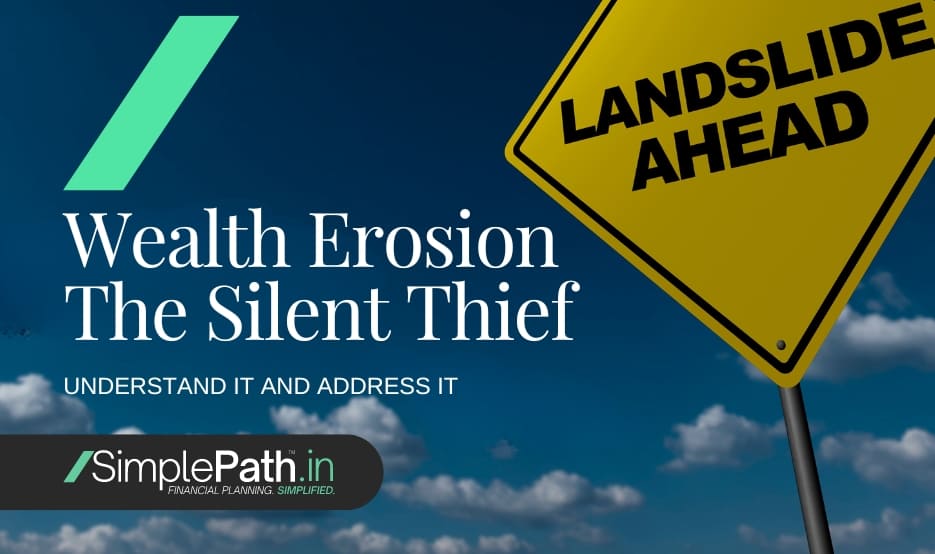Wealth erosion is a silent but relentless force that can chip away at our financial security. It’s the gradual or sudden depletion of one’s assets and financial stability due to various factors such as critical illness, disability, untimely death, inflation, and taxes. Imagine it as the erosion of a cliff over time or a landslide due to constant exposure to elements – it may not be immediately noticeable, but its impact can be profound.
Factors Contributing to Personal Wealth Erosion
1. Critical Illness:
Critical illnesses can strike unexpectedly, causing immense financial strain. Medical expenses, loss of income due to inability to work, and additional costs for specialized treatments can swiftly erode savings. For instance, a sudden diagnosis requiring extensive medical care can significantly diminish savings earmarked for other essential goals, perpetuating wealth erosion.
2. Accidental Disability:
Incapacity to work due to an accident that left one disabled and unable to work can drastically impact income streams. Long-term disability often leads to reduced earnings or reliance on savings to cover daily expenses and medical bills. This can expedite wealth erosion, especially if there isn’t a financial safety net in place.
3. Untimely Death:
The financial impact of an untimely demise on a family’s wealth cannot be overstated. Loss of the primary breadwinner’s income could lead to a sudden strain on the family’s financial stability. It might force the liquidation of assets or borrowing to meet day-to-day expenses, accelerating wealth erosion.
4. Inflation:
The silent wealth eroder, inflation gradually diminishes the purchasing power of money over time. Savings and investments that don’t outpace inflation lose value, affecting the ability to maintain the same lifestyle or meet future financial goals. For instance, a substantial retirement fund may seem secure now, but without accounting for inflation, it might not provide the same lifestyle in the future.
5. Taxes:
Taxation can significantly impact wealth accumulation and preservation. High taxes on income, capital gains, and estate assets can reduce the overall wealth accrued over time. Inadequate tax planning can result in substantial erosion of wealth that could have been preserved or utilized more effectively.
Safeguarding Against Personal Wealth Erosion: The Role of Life Insurance
While multiple factors contribute to wealth erosion, investing in life insurance plans can serve as a comprehensive solution to mitigate these risks. Life insurance acts as a financial safety net, offering protection against critical illness, disability, and untimely death, and can also provide strategies to counter the effects of inflation and taxes.
1. Protection Against Critical Illness:
Certain life insurance policies offer critical illness riders or standalone plans that provide a lump sum on diagnosis. This payout can cover medical expenses and provide financial stability during the recovery period, preventing the immediate erosion of wealth.
2. Income Replacement in Case of Disability:
Disability insurance within life insurance plans can provide regular income in case of disability, ensuring financial stability despite the inability to work. This helps in maintaining a steady stream of income, preventing the rapid depletion of savings.
3. Financial Security for Dependents Upon Untimely Death:
Life insurance serves as a crucial tool to secure the financial future of dependents in case of the insured’s untimely demise. The death benefit provides a lump sum that can cover immediate expenses, replace lost income, and prevent the need to liquidate assets hastily.
4. Inflation Hedge and Tax Benefits:
Certain life insurance plans come with investment components that can offer a hedge against inflation. Additionally, some policies offer tax benefits on premiums paid and the maturity amount, helping to preserve wealth by reducing the impact of taxation.
Final Thoughts
Wealth erosion is an ever-present threat that demands proactive measures to safeguard one’s financial stability. Understanding the factors contributing to erosion and adopting strategies like investing in life insurance plans can serve as a robust shield against unforeseen circumstances. By securing oneself against critical illness, disability, untimely death, and considering inflation and tax implications, individuals can take decisive steps towards securing their wealth and ensuring a more stable financial future.
Remember, wealth erosion is relentless, but with prudent planning and strategic investments like life insurance, it can be effectively curtailed, allowing your financial fortress to withstand the test of time.





